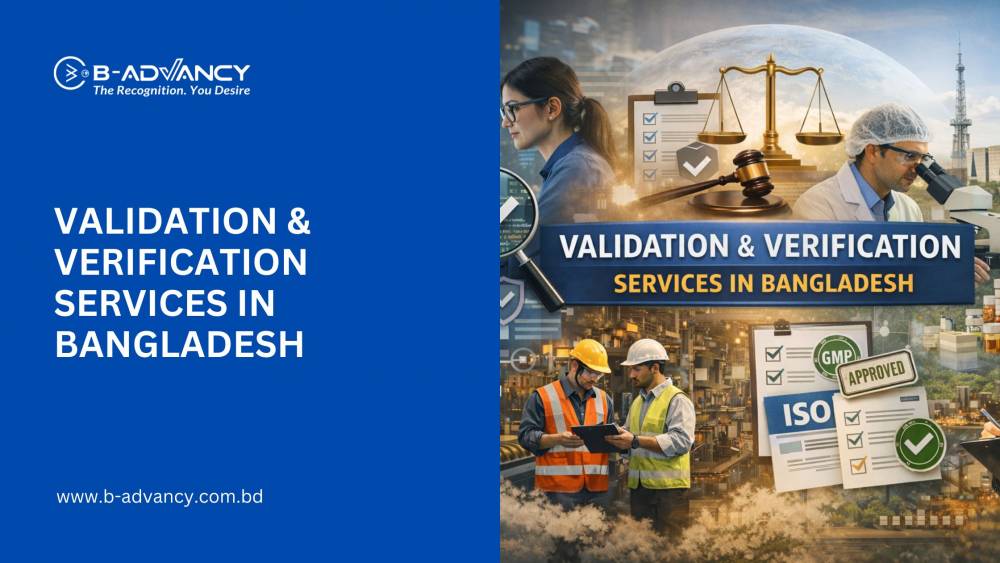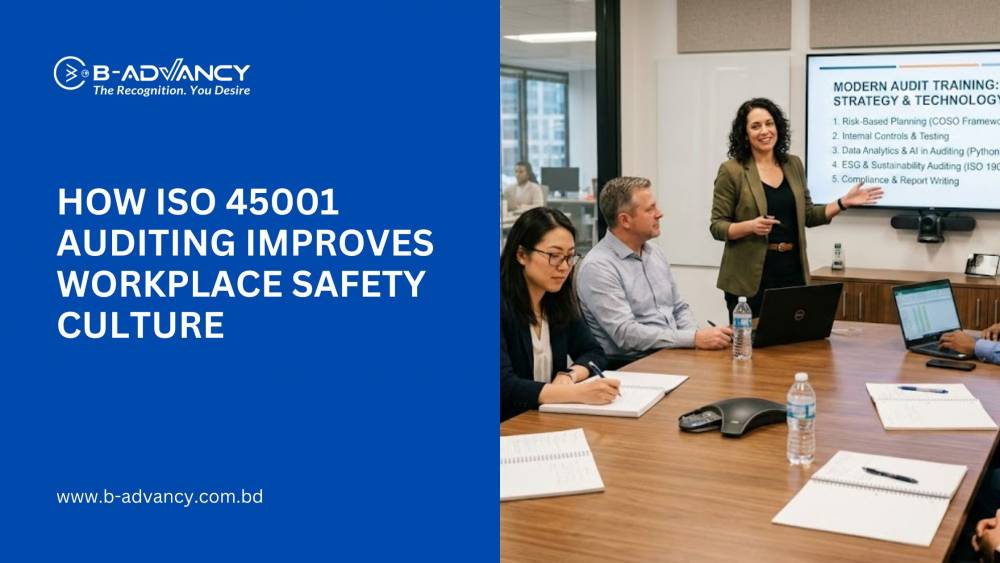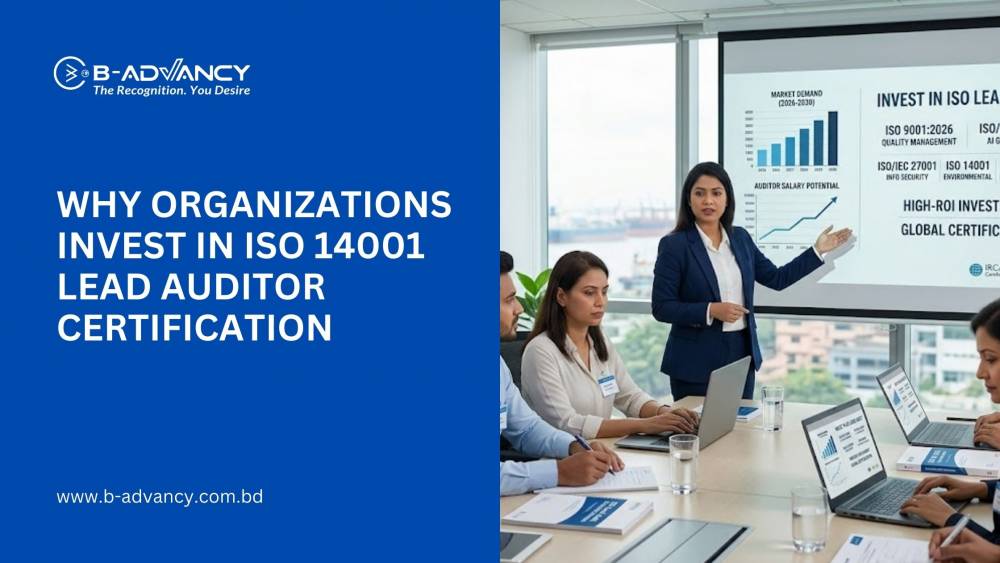In today's digital era, the Business Process Outsourcing (BPO) and Information Technology (IT) industries are pivotal in driving economic development and technological innovation. In Bangladesh, these sectors are experiencing rapid growth, with companies aiming to meet international standards for service quality, data security, and operational effectiveness. ISO certification provides a comprehensive framework that helps BPO and IT companies attain these goals, offering a globally recognized standard of excellence. In this blog, we will discuss the significance of ISO certification for the BPO and IT industries in Bangladesh, the relevant ISO standards, the advantages of obtaining certification, and the steps to start your certification journey with B-ADVANCY Certification Limited.
What is ISO Certification and Why is it Important for the BPO & IT Industry?
ISO certification is an official validation from the International Organization for Standardization (ISO) that confirms a company's compliance with one of its globally recognized management system standards. For the BPO and IT industries, ISO certification signifies a dedication to maintaining high standards of quality, data security, and operational effectiveness—essential elements for building trust with clients, partners, and regulatory bodies.
In Bangladesh, the BPO and IT sectors cover a wide range of services, including software development, IT support, data management, telecommunications, and more. Obtaining ISO certification can greatly enhance a company's ability to consistently provide high-quality services, safeguard sensitive information, and streamline processes. Furthermore, it can facilitate access to international markets by aligning businesses with global standards, which is increasingly vital in today's competitive global landscape.
Key ISO Standards for the BPO & IT Industry
Several ISO standards are particularly relevant to the BPO and IT industries in Bangladesh:
ISO 9001:2015 - Quality Management System
ISO 9001:2015 provides a structured framework for implementing a quality management system (QMS) that ensures services consistently meet customer expectations and comply with regulatory requirements. For BPO and IT companies, this standard is essential for maintaining service quality, enhancing customer satisfaction, and optimizing operational processes.
ISO/IEC 27001:2022 - Information Security Management System
ISO/IEC 27001:2022 is the premier international standard for information security management systems (ISMS). It offers a comprehensive approach to safeguarding sensitive data, ensuring its confidentiality, integrity, and availability. This is especially crucial for BPO and IT companies managing large volumes of sensitive information from clients.
ISO/IEC 20000-1:2018 - IT Service Management System
ISO/IEC 20000-1:2018 is the global standard for IT service management (ITSM). It ensures that IT services are delivered efficiently and effectively, aligning with both customer needs and business goals. This standard is vital for BPO and IT service providers aiming to enhance service delivery and client satisfaction.
ISO/IEC 27017:2015 - Code of Practice for Information Security Controls for Cloud Services
ISO/IEC 27017:2015 provides guidelines for information security controls specifically for cloud services, addressing unique risks in cloud computing environments. This standard is particularly important for BPO and IT companies offering cloud-based services, ensuring robust security practices.
ISO 14001:2015 - Environmental Management System
Although not specific to IT, ISO 14001:2015 is relevant for BPO and IT companies, particularly those operating large data centers or extensive office environments. It provides a framework for managing environmental responsibilities, promoting sustainability, and reducing the environmental impact of operations.
ISO 45001:2018 - Occupational Health and Safety Management System
ISO 45001:2018 focuses on creating a safe workplace by identifying and managing occupational health and safety risks. For BPO and IT companies, this standard is essential for fostering a safe and productive work environment, especially in settings where employees may face ergonomic and other workplace hazards.
PCI-DSS (Payment Card Industry Data Security Standard)
PCI-DSS is a set of security standards designed to ensure that companies handling credit card information maintain a secure environment. It outlines a framework of best practices for data protection, including requirements for encryption, access control, and regular security testing. Compliance with PCI-DSS helps organizations protect sensitive payment data, reduce fraud, and build customer trust.
SOC I and II (Service Organization Control)
SOC reports provide essential insights into the controls and processes of service organizations. SOC I focuses on financial reporting and internal controls, primarily for organizations that handle financial transactions or reporting on behalf of clients. SOC II, on the other hand, evaluates controls related to security, availability, processing integrity, confidentiality, and privacy of customer data. Both SOC I and II reports are crucial for IT and BPO companies as they demonstrate commitment to operational excellence and risk management.
CMMI (Capability Maturity Model Integration)
CMMI is a process improvement framework that helps organizations enhance their performance by optimizing processes across various domains, including software development and service delivery. Specifically for IT and BPO, CMMI provides a structured approach to improving product quality, reducing risks, and increasing efficiency. By achieving CMMI maturity levels, organizations can demonstrate their capability to deliver high-quality services and adapt to changing market demands.
Benefits of ISO Certification for the BPO & IT Industry in Bangladesh
Enhanced Service Quality and Customer Satisfaction
ISO certification helps IT companies establish and maintain processes that ensure high standards of service delivery. This leads to better customer satisfaction, higher retention rates, and a stronger reputation in the industry.
Improved Data Security
ISO/IEC 27001:2022 provides a robust framework for managing information security, helping companies protect sensitive data from breaches and cyber threats. This is increasingly important as cyber risks continue to rise globally.
Operational Efficiency and Cost Savings
By implementing ISO standards, IT companies can streamline their operations, reduce waste, and minimize errors. This leads to cost savings, higher productivity, and more efficient use of resources.
Compliance with Regulatory Requirements
ISO standards provide a structured approach to meeting both local and international regulatory requirements. This is particularly important in the IT industry, where compliance is critical to avoid legal issues and ensure continuous operation.
Increased Market Competitiveness
ISO-certified IT companies are often viewed as more reliable and trustworthy, which can be a significant competitive advantage. Certification can help attract new clients, partners, and investors, both locally and internationally.
Steps to Achieve ISO Certification for Your IT Business
Achieving ISO certification involves several critical steps:
Initial Assessment and Gap Analysis
Start by assessing your current processes against the requirements of the relevant ISO standard. Identify gaps and areas needing improvement to meet the certification criteria.
Develop and Implement a Management System
Design and implement a management system that complies with the chosen ISO standard. This may involve documenting processes, setting objectives, and training employees on new procedures.
Internal Audit and Management Review
Conduct internal audits to ensure your management system is effective and compliant. Regularly review the system with top management to address any issues and drive continuous improvement.
Select a Certification Body
Choose a reputable certification body, such as B-ADVANCY Certification Limited, to conduct an external audit. Prepare thoroughly for this audit to demonstrate compliance with the ISO standard.
Achieve Certification and Commit to Ongoing Improvement
After a successful audit, you will receive ISO certification. It’s important to maintain and improve your management system to retain certification and continue reaping the benefits.
Challenges in Implementing ISO Standards
While ISO certification offers numerous advantages, implementing these standards can pose challenges, including:
Resistance to Change
Employees may resist changes to established processes, especially in fast-paced IT environments. Effective communication and training are crucial to help staff understand the benefits of ISO certification.
Cost and Resource Allocation
The costs associated with certification, including consulting, training, and auditing, can be significant. However, the long-term benefits of ISO certification, such as improved efficiency and marketability, often justify these initial expenses.
Documentation and Process Management
Maintaining comprehensive documentation can be time-consuming but is essential for successful certification. A well-organized documentation system is key to demonstrating compliance during audits.
B-ADVANCY Certification Limited can guide you through these challenges with expert support, making the certification process more manageable and efficient. To contact them: Email: bangladesh@b-advancy.com | Call: +8801612264559
Conclusion
ISO certification is not merely a formality for the BPO and IT industries in Bangladesh; it is a strategic decision that can greatly improve service quality, data security, and overall market competitiveness. By aligning your business processes with globally recognized standards, your company can ensure consistent service delivery, boost customer satisfaction, and gain a competitive advantage in both domestic and international markets. Although the path to certification may come with its challenges, the long-term benefits far surpass the initial efforts, making it a worthwhile investment for sustainable growth.





































































































































































































